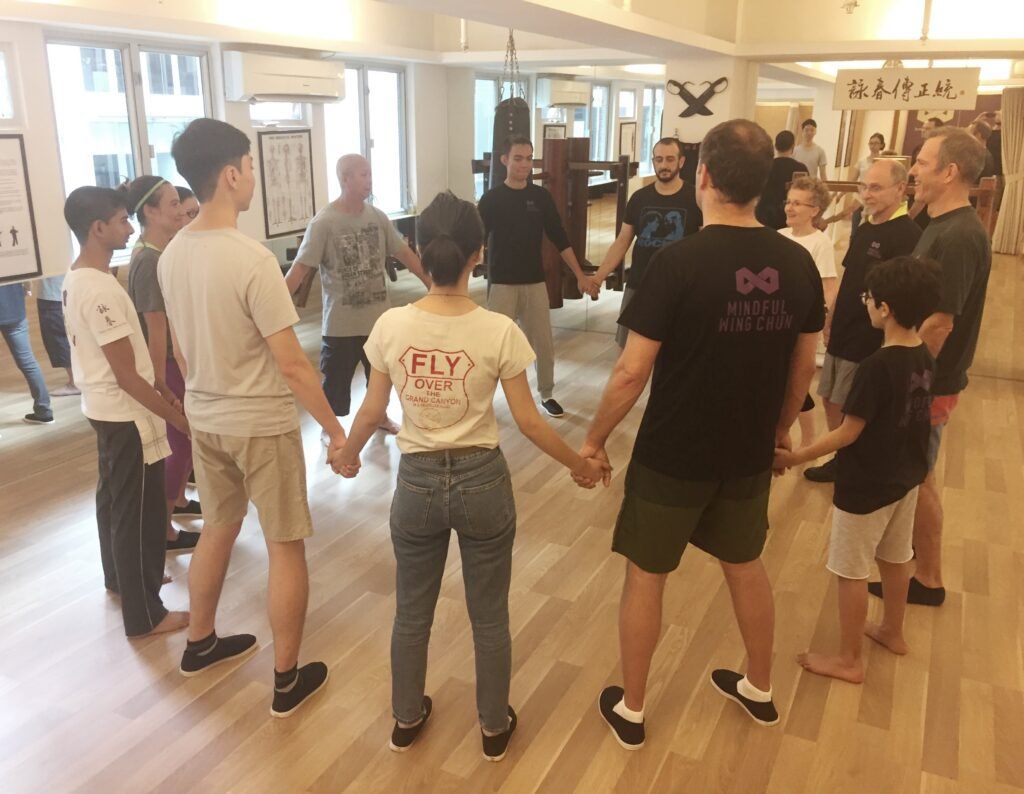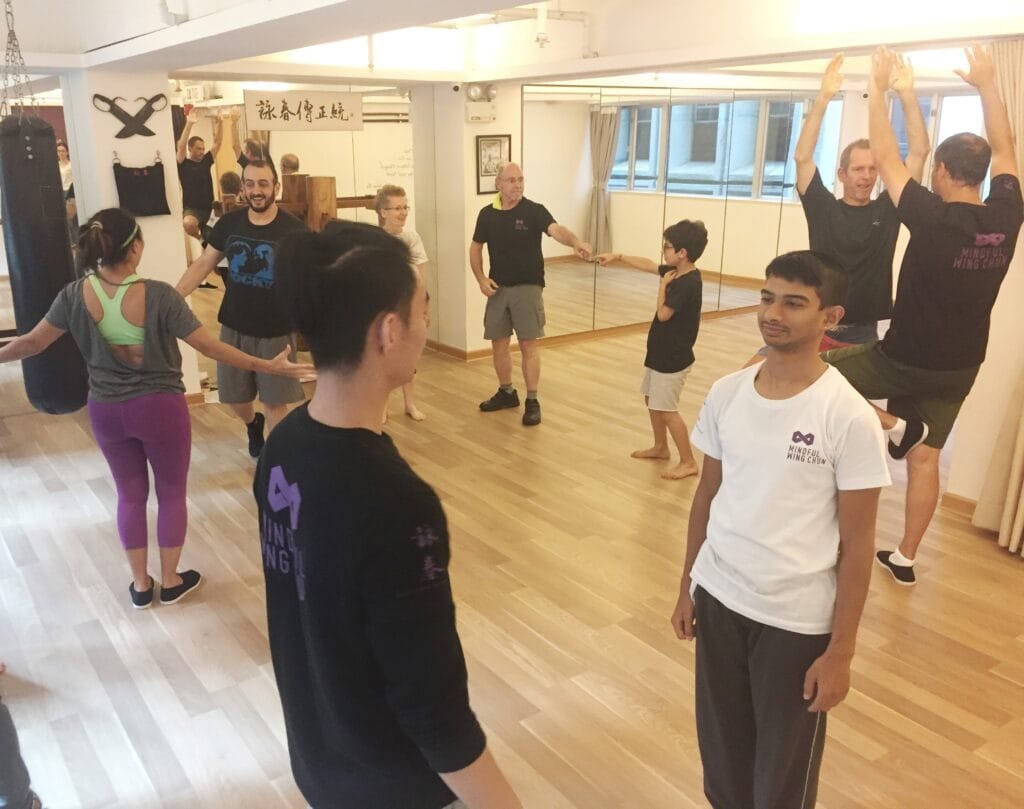Have you heard of improvisation (or “improv”)? It’s when a team of performers create scenes together onstage, on the spot, without a script.
I’ve been performing improv with People’s Liberation Improv, a local English-language improv troupe here in Hong Kong, for eight years, and I started attending MWC classes in September last year. I very quickly noticed that the principles and mindset of MWC are very similar to those of improv, and it occurred to me that my fellow MWC students would benefit from approaching their MWC practice (and their life) with an improv mindset.
So I contacted the MWC teachers with a proposal to present an improv class for them and the MWC students, and they bravely said yes.
In the fun, practical “Improv Your Mindful Wing Chun Practice” class on May 27, I led the 12 participants in some improvisational games, and we explored how the improv principles and mindset might apply in our MWC practice. It was a jump-in-and-participate workshop, not a sit-down-and-take-notes lecture.
In this blog post, I won’t share everything we did in the class, because the MWC team and I are planning to present it again later this year (date to be confirmed). However, I will share some of the underlying ideas.
What I love about Mindful Wing Chun
What I love about Mindful Wing Chun is that the focus is not on punching and kicking – it’s on mindfulness. So it’s all about relaxing; being exquisitely aware of what’s happening in our body; moving effortlessly; being present in the moment; having a very focused intention; responding rapidly and instinctively to what our sparring partner is doing; letting go of left-brain thinking; being compassionate with ourselves in our practice; trusting the principles… And I love that in class, we support and encourage each other, and celebrate each other’s successes.
What I love about improv
What I love about improv is that to perform together successfully without a script, improvisers have to relax, physically and mentally; let go of that critical internal voice (“not good enough”, “not funny”, “they won’t like it”); pay attention to everything that’s happening in us and around us; use our whole body effectively and efficiently; make quick decisions; trust our instincts; let go of left-brain logic and planning and expectations; watch, listen and feel with all of our senses; respond nimbly to change and the unexpected; release our fear of making mistakes; let go of ego, and make our team-mates look good. (It’s not about telling jokes or being funny.)
In the class, I shared the key principles of improv. The number-one principle that improvisers everywhere learn is “Yes, and…”. That means we accept “the offer” (i.e., what the other player in our scene says or does, or what’s happening in and around us) and we build on it to give the other player something to respond to. Like a ping-pong game. When I say “accept”, that doesn’t necessarily mean we have to like or agree with what the other player said or did – it means we accept that it’s the truth of what’s happening right here, right now. We’re willing to truly hear the other person, rather than immediately blocking them with a “No” or a “Yes, but…”.
Freedom and safety
In MWC and in improv, we learn the underlying principles of the form, and we practise the basic skills until they become instinctual in our body, so that we don’t have to think analytically about what to do next – because we don’t have time to do that. We trust that the principles and mindset will guide us – there’s a structure, and there’s freedom and safety to improvise within that structure.
And when we take the principles and mindset of both MWC and improv out into our life and work, we boldly say “Yes, and…” to ideas and opportunities, we’re comfortable with change and the unknown, we’re playful, and we practise mindfulness in every moment.

Comments from participants
“Kay that was great… so much fun and you tied it in so perfectly to Wing Chun… Great energy, great class and great teacher…”
“Today’s improv class was quite special! What I learned, which I did not go into the class expecting, is that the essence of improv is surrender! To let go of my thinking and allow my body, impulse, instinct and feeling guide what was to happen next. For me this is exactly what true kung fu aims to give us, at its heart: a freedom from all the blocks our thinking can build up around us!”
“Thank you for the class Kay really fun and learned a lot from you today.”
“Really enjoyed the class Kay Ross. You lead us into some interesting and fun experiences. Was a fantastic way to learn trust and creativity!”
Some articles about the intersection of improv and mindfulness
“34 Reasons To Learn Improv” by Kay Ross
“Mindfulness and Improvisation Thoughts” by Kelly Leonard
“Improv Changed My Life: 10 Ways It Will Make YOU Awesome” by James Berges
Excerpt in point 9: “Meditation and improv complement each other perfectly. You have to have a calm center with zero preconceived notions when improvising, but you still have to act fast and have complete awareness of your environment. Basically, improv is mindfulness put into dynamic social situation; you learn to respond with finesse and create a win/win for everyone involved.”
“Mindfulness and Improv: A Conversation with Steve Clorfeine” by Lynn Hartley
Stay tuned for news about the next “Improv your Mindful Wing Chun Practice” class!!
The Improv Principles
1. Yes, and… = accept the offer and build on it.
2. Make your team-mates look good (and trust that they’re doing the same for you).
3. Be present in the here and now – listen, pay attention, be observant.
4. Be changed/affected by what happens – let go of plans/expectations.
5. Make bold choices, commit, and take action.
6. Be spontaneous – go with your first impulse, no self-editing.
7. Embrace failure, risk, experimentation, uncertainty.
8. Have fun!
by Kay Ross


